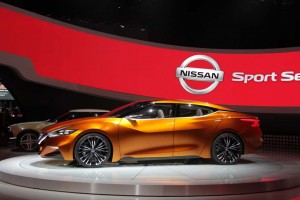It’s been a cold month in Hell, Michigan and much of the rest of country this winter, and February is looking to deliver another big chill to the auto industry, February sales likely to echo the unexpected cool-down experienced last month.
But the impact is likely to be short-lived, suggested Fred Diaz, the new Nissan division boss, during an appearance at the Automotive Press Association on Thursday. “I’m not a believer you lose sales for good” because of bad weather, he said. “You only delay sales” that the industry will likely regain once the weather warms up.
On the downside, the Nissan executive – who joined the company a year ago after spending a quarter-century with Chrysler – said the auto industry likely needs to prepare for a slowdown in the pace of its recovery since the end of the Great Recession. Since bottoming out in 2010, U.S. auto sales have been growing at better than double-digit annual rates, but Diaz cautioned that level of “growth is unsustainable. We’re already seeing signs it will level off.”
But when it comes to Nissan, Diaz has a reason to be upbeat considering the maker was one of the few automotive brands to actually post a sales increase in January. Even more significant, the maker saw a 1.1-point jump in its market share for the month – a significant increase in a highly competitive industry where Diaz acknowledged he would normally “give my right arm” for a tenth-of-a-point increase.
(Nissan’s Infiniti brand lands finalist for World Car of the Year. Click Here to see which model.)
That increase was perhaps all the more surprising since Nissan has been trimming its rebates and other incentives in recent months. While Diaz wouldn’t provide an absolute figure he said the brand’s typical giveback is now $375 per vehicle less than a year ago, and about $275 less than the industry average.
That’s slightly out of line with the numbers from tracking firm TrueCar.com, which estimated January incentives at $2,459 for the industry and $2,572 for Nissan, but the Japanese maker, according to TrueCar, cut January givebacks by 8.4% compared to just the month before.
That move is in line with the strategy of Nissan Motor Co. CEO Carlos Ghosn who, said Diaz, “is very emphatic about telling us profitability is our number one goal,” rather than sales or market share. “He wants us to aggressively pursue (share),” explained the U.S. executive, “but not at the expense of profits.”
(Strong sales, weak yen drive up Nissan’s earnings in 2013. Click Herefor more.)
Of course, there’s a clear and consistent link between new products, sales, share and profit margins. And it helps that Nissan has completely revamped some of its key models – which collectively represent 75% of its U.S. volume – over the past 18 months. That includes such vehicles as the Rogue crossover and the Altima sedan.
Altima has missed its aggressive goal of displacing the Toyota Camry as the nation’s best-selling passenger car but is still one of the top-sellers in the midsize sedan segment.
Nissan is planning to launch several other remakes in the next year or so. It revealed a Sport Sedan Concept at the recent Detroit Auto Show that was a thinly disguised version of the next-generation Maxima sport sedan. An all-new version of the midsize Murano crossover will be unveiled at the New York Auto Show in April, and the maker is expected to pull the wraps off an all-new version of the Titan pickup at next January’s Detroit Auto Show.
(Click Here for a look at the sporty new Nissan Versa SR.)
The current version of the full-size pickup is now a dozen years old, a lifetime in an industry that typically replaces key models every six to eight years. That, Diaz acknowledged, was a “snafu,” in part the result of a plan to partner with Chrysler on the Titan replacement. But after the U.S. maker emerged from bankruptcy in 2009, it decided not to share its Ram 1500 with Nissan. That sent the Japanese company racing to develop its own full-size truck, a lengthy process.
But during his appearance in Detroit, Diaz hinted the next-generation Titan will not only offer a previously announced diesel but also be built in a wider range of body styles to cover more of the diverse pickup market.
While product is key, Diaz said Nissan is also working on several other projects that it expects will improve customer satisfaction, owner loyalty and dealer commitment to the brand. That includes the new “acceleration program” intended to simplify the vehicle purchasing process for both buyers and dealers. If it delivers as planned, the acceleration program alone, said Diaz, should boost Nissan’s U.S. market share by as much as another half point.


